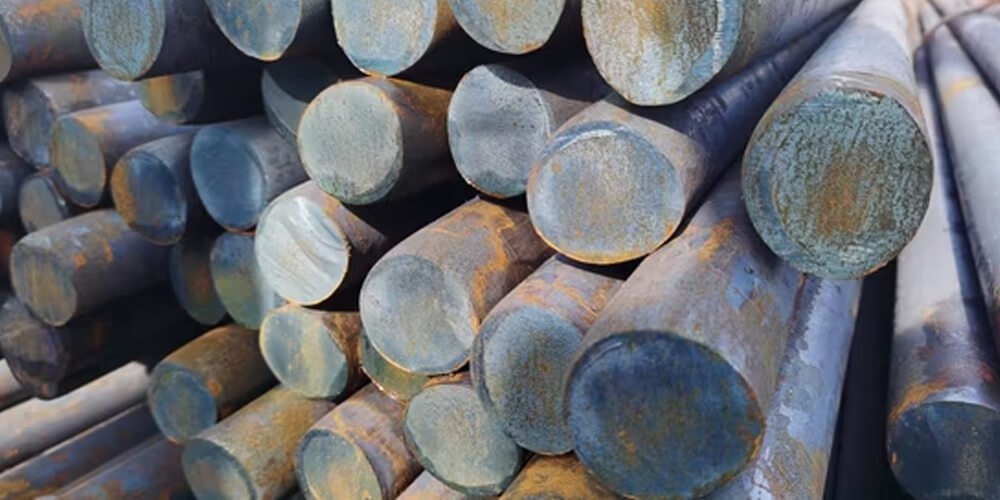20CrMnTi Special Alloy Steel Manufacturers in Mumbai | Industrial Grade
Titan Steel a trusted 20CrMnTi Special Alloy Steel Manufacturers in Mumbai offering premium-quality alloy steels for automotive, aerospace, construction, and industrial applications. Get corrosion-resistant, durable, and precisely engineered alloy steels with competitive pricing and timely delivery from reliable suppliers in Mumbai.
20CrMnTi Alloy Steel: Comprehensive Guide
20CrMnTi is a versatile alloy steel known for its excellent wear resistance, toughness, and strength. It is commonly used in the manufacturing of components that require high mechanical performance and durability.
Introduction to 20CrMnTi Alloy Steel
20CrMnTi is a low-alloy steel that combines chromium, manganese, and titanium to achieve a balanced blend of strength, hardness, and toughness. It is widely used in various industrial applications due to its favorable mechanical properties and good machinability.
Key Features of 20CrMnTi Alloy Steel:
- High Wear Resistance: Enhanced by the presence of chromium and titanium.
- Good Toughness: Provides impact resistance and durability.
- High Strength: Suitable for high-stress applications.
- Machinability: Offers good machinability in the heat-treated condition.
Applications of 20CrMnTi Alloy Steel
20CrMnTi is utilized in applications that require superior mechanical properties and durability. Its properties make it ideal for parts subjected to significant stress and wear.
Typical Applications Include:
- Automotive Components: Gears, shafts, and camshafts.
- Industrial Machinery: Drive shafts, spindles, and couplings.
- Engineering Parts: Crankshafts, pinions, and valve stems.
- Manufacturing Equipment: Molds, dies, and high-load bearings.
Equivalent Grades of 20CrMnTi Alloy Steel
20CrMnTi is recognized under different standards, ensuring compatibility across various industries and regions.
| Standard | Equivalent Grade |
|---|---|
| DIN | 1.7115 |
| EN | 20CrMnTi |
| AISI/SAE | 4320 |
| BS | 817M40 |
Chemical Composition of 20CrMnTi Alloy Steel
The chemical composition of 20CrMnTi is designed to achieve the desired mechanical properties. The typical composition is as follows:
| Element | Composition (%) |
|---|---|
| Carbon (C) | 0.17 – 0.23 |
| Silicon (Si) | 0.35 max |
| Manganese (Mn) | 0.70 – 1.00 |
| Phosphorus (P) | 0.035 max |
| Sulfur (S) | 0.035 max |
| Chromium (Cr) | 0.90 – 1.20 |
| Titanium (Ti) | 0.10 – 0.30 |
This composition ensures that the steel achieves a balance of hardness, toughness, and wear resistance.
Mechanical Properties of 20CrMnTi Alloy Steel
The mechanical properties of 20CrMnTi are crucial for its performance in high-stress applications. The following table summarizes these properties:
| Property | Value (Typical) |
|---|---|
| Tensile Strength (MPa) | 800 – 1000 |
| Yield Strength (MPa) | 600 – 850 |
| Elongation (%) | ≥ 15 |
| Impact Toughness (J) | ≥ 40 (at room temperature) |
| Hardness (HB) | 190 – 230 |
These values indicate the steel’s ability to withstand stress and impacts while maintaining good hardness.
Heat Treatment of 20CrMnTi Alloy Steel
Heat treatment processes are essential for achieving the desired mechanical properties in 20CrMnTi. The following processes are commonly used:
- Hardening: Heat to 850 – 880°C and quench in oil or water to increase hardness.
- Tempering: Heat to 150 – 200°C after hardening to improve toughness and reduce brittleness.
- Normalizing: Heat to 850 – 880°C and air cool to refine grain structure and enhance toughness.
These treatments help to tailor the steel’s properties for specific applications.
Hardness of 20CrMnTi Alloy Steel
The hardness of 20CrMnTi can be adjusted through heat treatment processes. Typical hardness values are:
- Annealed Condition: 160 – 190 HB
- After Hardening and Tempering: Up to 50 HRC
These hardness values reflect the steel’s capability to resist wear and deformation under load.
Physical Properties of 20CrMnTi Alloy Steel
The physical properties of 20CrMnTi contribute to its performance and reliability. The following table summarizes these properties:
| Property | Value |
|---|---|
| Density (g/cm³) | 7.85 |
| Melting Point (°C) | 1420 – 1460 |
| Thermal Conductivity (W/m·K) | 40 – 45 |
| Specific Heat Capacity (J/kg·K) | 460 – 480 |
These properties ensure stability and performance in various operating conditions.
Forging Properties of 20CrMnTi Alloy Steel
20CrMnTi can be forged at temperatures ranging from 1150 – 1250°C. It is important to cool the forged components slowly to avoid internal stresses and maintain dimensional stability.
Stress Relieving for 20CrMnTi Alloy Steel
Stress relieving involves heating the steel to 600 – 650°C to remove residual stresses from machining or forming. This process improves dimensional stability and reduces the risk of deformation.
Normalizing 20CrMnTi Alloy Steel
Normalizing is performed by heating the steel to 850 – 880°C and allowing it to cool in air. This process enhances toughness and refines the grain structure.
Annealing 20CrMnTi Alloy Steel
Annealing involves heating the steel to 680 – 720°C and cooling it slowly in the furnace. This process improves machinability and prepares the steel for further heat treatments.
Machinability of 20CrMnTi Alloy Steel
20CrMnTi alloy steel exhibits good machinability, particularly in its annealed condition. It can be machined into complex shapes with standard cutting tools, although care should be taken to manage tool wear during high-hardness operations.
Welding of 20CrMnTi Alloy Steel
Welding of 20CrMnTi is feasible with proper preheating (to about 150 – 200°C) and post-weld heat treatment. Following appropriate welding procedures helps prevent issues such as cracking or reduced toughness.
Titan Steel & Engineers Related Products:
Carbon Steel, Alloy Steel, Bright Steel, Spring Steel, Die Steel & Tool Steel, Special Alloy Steel
For Visit us Maps


